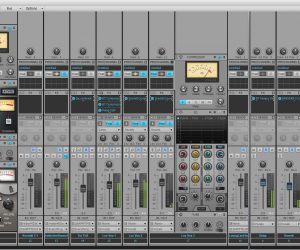
Review: RØDE Podcaster
Anyone with a computer can now be a ‘podcaster’.
The Podcaster might not be the first USB mic on the market, but it’s the first to make its intentions so blatant. Yes, it’s for podcasting – and all the multifarious innovations and evils that the word entails.
You know, and I know, that any mic is essentially appropriate for podcasting – so long as you have a preamp and a way of recording it – but Joe Punter as he wheels around in the electronics store uncertainly deliberating over a way to get his deepest thoughts ‘out-there’ will naturally be attracted to something labelled ‘Podcaster’. Meanwhile, Harvey Norman floor staff will hardly be able to believe their luck – talk about an easy sell (“You wanna podcast? Well, here’s your mic”)!
I’m not meaning to sound cynical here, it is after all a canny move on the part of Rode, and I wish them well. But my feeling is, my ‘wishes’ won’t be required; the bulk of Podcaster sales will not be to AT readers, it’ll be the people who don’t know a cardioid from cardigan.
With that in mind, Rode has launched a whole new website dedicated to podcasting and the Podcaster. It’s a very smart and impressive site (www.rodepodcaster.com) with some good advice on how to get you on your podcast feet. Well-known voiceover man, Ken Sparkes, takes would-be podcasters by the hand, working through basic mic technique etc. Alongside the tips is a Podcaster forum to hear and be heard – just log on and create a user name for yourself.
This isn’t Rode’s first broadcast mic – the Broadcaster has that distinction. But the Podcaster seems to be inspired by the Electrovoice RE20 a little more – and why not… as the RE20 is an absolute legend in the broadcast field. So the Podcaster bears more than a passing resemblance to the RE20 both aesthetically (long, imposing barrel-chested end-address mic), internally (a dynamic capsule well set back from the ‘nose’ of the mic) and sonically (a noticeable lift around 9kHz).
BROADCASTING THE FACTS
But it’s easy to make too much of the RE20 comparison, as clearly, there are some very obvious differences. First up is the USB lead sticking out of the Podcaster’s rear end. The Podcaster has an onboard A/D converter (18-bit and up to 48k sampling) and then packages off the data to your PC via USB. To state the obvious, this obviates the need for a preamp or a mixing console – just go directly to your computer. The second big departure is the 3.5mm headphone socket. And not just a jack but a volume pot. Integrating a headphone amp is a real stroke of genius. It allows for latency-free monitoring of your voice, and is one less thing for people to worry about when it comes to setting up their PC.
The Podcaster could hardly be easier to ‘operate’. Once you’ve plugged it in, a status LED glows red momentarily and then green once it senses bus power. And that’s it. Job done… no questions asked, no dialogue boxes to contend with, nothing. If you’re after more computer-based control over the mic then download a little control panel from the Rode site – it offers a volume slider and a mute button.
Working with the Podcaster is a pleasure. It’s easy to get more than enough level (both on the output of the mic and the headphone) and the sound of the mic was instantly satisfying. One caveat, when I first sparked up the Podcaster I was a bit concerned about some low-level hum. It transpired that I was picking up computer noise. So, as ever, be aware of what hums you have in your room, but given the Podcaster is a computer ‘companion’ product it might be harder to fully escape the racket of a PC fan.
Adding to the Podcaster’s appeal are the optional accessories. Podcaster comes packaged with a regulation mic stand mount but, for my money, you’ve simply got to invest in the ‘extras’. First up is the PSM1 shockmount. The Podcaster is already internally shockmounted, and is nicely resistant to the odd shake, but the PSM1 offers greater protection. Next, and the real deal-clincher for me, is the PSA1: an ‘anglepoise’-style arm that clamps neatly to your desk edge (with a bolt-on option for something more permanent). With the Podcaster in place at the end of the arm, it sits perfectly balanced, swivelling a full 360 degrees and extending the reach of the mic over its dual pivot-point span. Combine the shockmount with the arm and for less than $200 extra you’re instantly transported from ‘lonely hack in the spare bedroom’ to ‘golden tonsils professional’. I just loved the setup, and couldn’t stop unctuously intoning ‘Valvoline… you know what I mean’ incessantly into the end of the mic.
POD ALMIGHTY?
The Podcaster is suitable for any application where vocal clarity and direct digital connection is required. If you have a laptop then, in theory, you could be recording podcasts from a street in Bagdad’s Red Zone… But, this is not really a ‘portable’ mic and lends itself to a desk job. Speaking of which, ask Rode about its desktop baby tripod stand which I reckon gives this mic some extra portability and is. a good option for those not wanting the full PSA1 extendo-arm.
The Podcaster is great. The price is right, it’s easy to integrate into your computer setup, and the accessories are very cool. It turns any home-spun ‘broadcast’ studio into something entirely more serious… ‘if you know what I mean’.
















RESPONSES